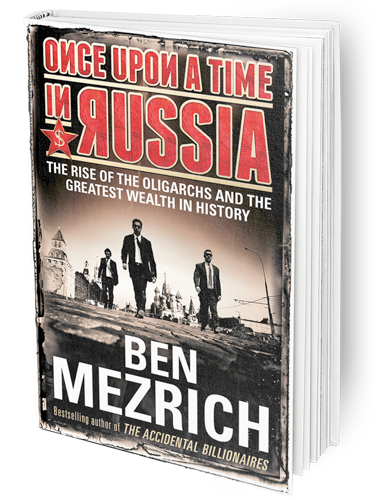I just recently read and blogged about another book by Ben Mezrich, Seven Wonders, so have a look there to get more background. I had decided to try one of his "non-fiction" works since they have been so popular. This is the story of Russia's rocky transition from communism to capitalism, when state owned businesses were auctioned off to the highest bidder. Boris Berezovsky was one of a group of men who rose, often from poor backgrounds, to incredible wealth in the process and became known as The Oligarchs. Berezovsky went from co-owning Lada (cars) to buying the national broadcasting system and eventually used it to keep Yeltsin in office. He had such strong connections to the Kremlin that he was virtually untouchable. When Yeltsin's health continued to fail, however, Berezovsky worked with other Oligarchs to elect a previously little know ex-KGB agent to the office, thinking to avoid the persistent threat of a return to communism, and to put in place a malleable man. But somewhere the calculations went wrong. Putin changed colors and became an obstacle rather than the expected collaborator and he went after the Oligarchs when Berezovsky attacked him in the press. Eventually, Berezovsky was driven from Russia into exile, first in France then in England. Roman Abramovich, who came to own the state oil and aluminum companies under Berezovsky's protection, somehow managed to keep his head down and stay in Russia, eventually paying Berezovsky over a billion dollars to dissociate himself from Abramovich. Litvenenko, a close associate of Berezovsky's and former FSB official who blew the whistle on corruption in the FSB, had previously fled to England, after serving a term in prison under Putin's orders. He was infamously murdered by polonium poisoning, perhaps also to be laid at Putin's door. Berezovsky eventually killed himself when he realized he could not go home and was no longer the significant king-maker, mover and shaker that he had once been.
Fascinating story that certainly has a factual basis, although Mezrich seems to create a lot out of thin air. I find Mr. Mezrich's writing style not to my taste as it is hyperbolic and somewhat sloppy, but I suppose that sort of rabid prose appeals to a lot of readers. Nevertheless, I learned something about this period and the players in recent Russian history (mid-1990's to 2013) and so it was worth it to me to read this book. Straightforward review here from Kirkus; The Boston Globe also takes issue with Mezrich's writing style as does The Chicago Tribune (which also has a picture, I think, of Berezovsky if you are interested).
Fascinating story that certainly has a factual basis, although Mezrich seems to create a lot out of thin air. I find Mr. Mezrich's writing style not to my taste as it is hyperbolic and somewhat sloppy, but I suppose that sort of rabid prose appeals to a lot of readers. Nevertheless, I learned something about this period and the players in recent Russian history (mid-1990's to 2013) and so it was worth it to me to read this book. Straightforward review here from Kirkus; The Boston Globe also takes issue with Mezrich's writing style as does The Chicago Tribune (which also has a picture, I think, of Berezovsky if you are interested).

No comments:
Post a Comment